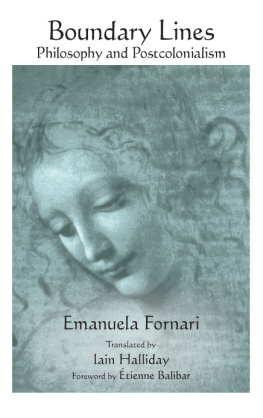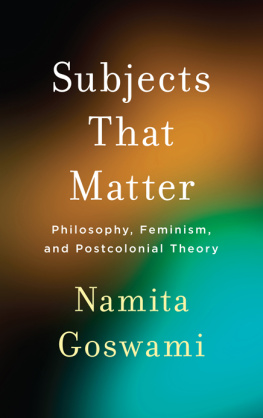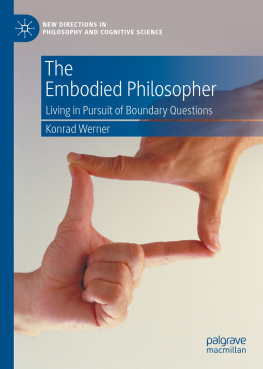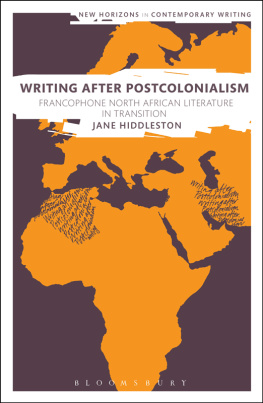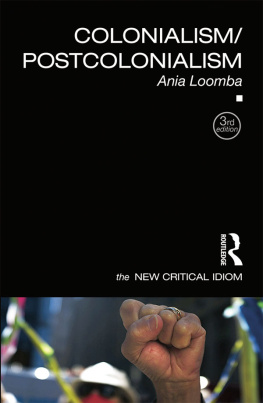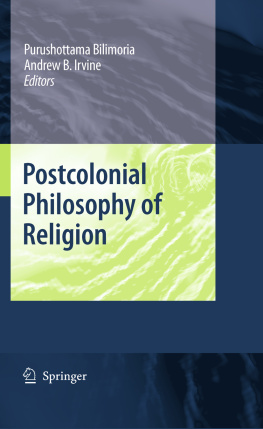Emanuela Fornari - Boundary Lines: Philosophy and Postcolonialism
Here you can read online Emanuela Fornari - Boundary Lines: Philosophy and Postcolonialism full text of the book (entire story) in english for free. Download pdf and epub, get meaning, cover and reviews about this ebook. year: 2018, publisher: State University of New York Press, genre: Politics. Description of the work, (preface) as well as reviews are available. Best literature library LitArk.com created for fans of good reading and offers a wide selection of genres:
Romance novel
Science fiction
Adventure
Detective
Science
History
Home and family
Prose
Art
Politics
Computer
Non-fiction
Religion
Business
Children
Humor
Choose a favorite category and find really read worthwhile books. Enjoy immersion in the world of imagination, feel the emotions of the characters or learn something new for yourself, make an fascinating discovery.
- Book:Boundary Lines: Philosophy and Postcolonialism
- Author:
- Publisher:State University of New York Press
- Genre:
- Year:2018
- Rating:3 / 5
- Favourites:Add to favourites
- Your mark:
- 60
- 1
- 2
- 3
- 4
- 5
Boundary Lines: Philosophy and Postcolonialism: summary, description and annotation
We offer to read an annotation, description, summary or preface (depends on what the author of the book "Boundary Lines: Philosophy and Postcolonialism" wrote himself). If you haven't found the necessary information about the book — write in the comments, we will try to find it.
Boundary Lines: Philosophy and Postcolonialism — read online for free the complete book (whole text) full work
Below is the text of the book, divided by pages. System saving the place of the last page read, allows you to conveniently read the book "Boundary Lines: Philosophy and Postcolonialism" online for free, without having to search again every time where you left off. Put a bookmark, and you can go to the page where you finished reading at any time.
Font size:
Interval:
Bookmark:

Boundary Lines
SUNY series in Contemporary Italian Philosophy
Silvia Benso and Brian Schroeder, editors
Boundary Lines
Philosophy and Postcolonialism
Emanuela Fornari
Translated by
Iain Halliday

Published by State University of New York Press, Albany
Linee di confine. Filosofia e postcolonialismo by Emanuela Fornari 2011, Bollati Boringhieri editore, Torino
English translation 2019 State University of New York
All rights reserved
Printed in the United States of America
No part of this book may be used or reproduced in any manner whatsoever without written permission. No part of this book may be stored in a retrieval system or transmitted in any form or by any means including electronic, electrostatic, magnetic tape, mechanical, photocopying, recording, or otherwise without the prior permission in writing of the publisher.
For information, contact State University of New York Press, Albany, NY
www.sunypress.edu
Library of Congress Cataloging-in-Publication Data
Names: Fornari, Emanuela, author.
Title: Boundary lines : philosophy and postcolonialism / Emanuela Fornari : translated by Iain Halliday.
Other titles: Linee di confine. English
Description: Albany : State University of New York, 2019. | Series: SUNY series in contemporary Italian philosophy | Includes bibliographical references and index.
Identifiers: LCCN 2018027700 | ISBN 9781438474113 (hardcover : alk. paper) | ISBN 9781438474137 (ebook)
Subjects: LCSH: HermeneuticsHistory20th century. | PostcolonialismPhilosophy. | Cultural relations.
Classification: LCC BD241 .F64713 2019 | DDC 325/.301dc23
LC record available at https://lccn.loc.gov/2018027700
10 9 8 7 6 5 4 3 2 1
For my father,
to his unforgettable smile
tienne Balibar
TIENNE B ALIBAR
Emanuela Fornaris book is magnificent in its clarity, precision, and depth. And the fact that the author has chosen to cite, in the course of her arguments, essays or works in which I myself have touched on some of the issues she deals with, will not prevent me in any way from singing her praises: this because, as with all her other sources, the use she makes of them is entirely original. For me it is an honor to present her book to its Italian readership (as I hope I will present it to further readers). This provides me with an occasion to measure the progress made by a new generation of philosophers whose qualities of reflection, information, and provocation are brilliantly illustrated by the author. It is thanks to them if we are all now ableand if we will be able in the futureto continue our work without repeating ourselves too much.
In the title of Emanuela Fornaris book, the two lemmas that thematically delimit the fieldphilosophy and postcolonialismbear equal significance: consequently the meaning of the conjunction that binds them must be carefully pondered. This is not a simple work of history of ideas or of documentation, like the various and extremely useful existing contributions (mostly in English) that we find dutifully inventoried and consulted, but rather it is a conceptual problematization that takes the risk of generalizing and assessing the formulations of postcolonial authors so as to understand what they think, how they think it, and how they oblige us to think after them. Nevertheless, this synthesisattentive to nuances, to evolutions and to oppositions, in a word attentive to the life of the research work it reports ondoes not depart from an illusorily dominant point of view (something which, it must be said, would be particularly grotesque given that it deals with a current of thought that has applied a radical criticism to all the presuppositions of intellectual history, worked-out and projected by the West over the entirety of the worlds cultures). On the contrary, this work distinguishes itself by virtue of real exposure to difference, and by the intense effort expended in penetrating the motivations, the logic, the implications of new discourses that have overturned the instruments of philosophical rationality, pitting them against their traditional use. This recognition of alterity, in the midst of the surprise and destabilization that comes with it, is not however accompanied by any servility, by any abdication of the critical spirit. The author proceeds step by step, and of the postcolonial authors she asks for an account of their reasoning , seeking that which creates their collective strength and on occasion divides them without any posturing, taking herself to the limits of what they put forward and revealing through this the coefficient of uncertainty that eats into and permeates their thought.
Emanuela Fornaris book thus illustrates a profoundly engaged conceptionnot only dialogic, but dialecticof philosophy. I agree with her that this is the only fertile way for our discipline in the new conditions that mondialisation imposes on it: conditions that it must know how to deal with in order that it may have today a sense and a usefulness. This book will thus allow many readers to learn what is at stake theoretically as a result of the birth and the flourishing of postcolonialism. But it will also contributeat least I hope it willto the universalizing and the deepening of this paradigm. Postcolonial thought has now produced sufficiently revolutionary effects on our concepts of historicity, of theoretical practice, of subjectivity, of universality, of collective political capacity, for us to able to face the feedback of its own formulations. Works that are accurate, respectful, incisive, like Emanuela Fornaris (in all truth, I know of no equivalent of her at the moment in any other language), will progressively bring to light what is at stake. It is here, after all, that one of the essential functions of philosophy resides. The diagnosis of the present that underpins its conceptual elaborations must always involve a self-critical dimension. It is for this reason that it seems important to me to observe how in this book the rigor of an impeccable historical and exegetic method proceeds in step with the boldness of the reconstructions and the absolute freedom of the interpretations and the comparisons.
Within the limits of this presentation, which ultimately seeks to be nothing more than a summary of the impressions of an early reader, I obviously have no intention of summarizing the content of the book you are about to read. To do that would lead inevitably to a simplification and distortion of the analyses within. I would like, nevertheless, to raise three questions that I asked myself in reading it and which, perhaps on reaching the end, readers of the work will want to attempt to answer in their own way, thus prolonging the movement that it has so powerfully initiated. The first regards the new pragmatics of the subject implied by the elaboration of the category of subalternity in the entirety of the critical work that came out of the formulations of the Subaltern Studies group, and more precisely that which might be called the double bind of the emancipation that this category identifies a need for, a need at once ethical and political. The second question regards the modes of the conflicts that model a universalism with no foundation other than differences, of which the untranslatable represents both a source of energy and an uncrossable limit at one and the same time. The third hinges on the political and institutional geography within which this intellectual activity operates, an activity that in a spectacular way has ended up placing the recognition of borders, of territories, of localities, at the heart of its reconstruction of historicity; thus the delicate question of knowing to what extent that which it defines as a transition could well be, from some points of view, nothing other than transitory .
Font size:
Interval:
Bookmark:
Similar books «Boundary Lines: Philosophy and Postcolonialism»
Look at similar books to Boundary Lines: Philosophy and Postcolonialism. We have selected literature similar in name and meaning in the hope of providing readers with more options to find new, interesting, not yet read works.
Discussion, reviews of the book Boundary Lines: Philosophy and Postcolonialism and just readers' own opinions. Leave your comments, write what you think about the work, its meaning or the main characters. Specify what exactly you liked and what you didn't like, and why you think so.

